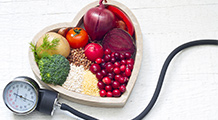Could you have high blood pressure - and not know it?

Why is persistent, elevated blood pressure, a 'silent killer'? Almost half of South Africans have this condition. It doesn't always show symptoms yet causes heart attacks, strokes and more. Are your lifestyle choices fuelling this disease?
Quick and easy - a blood pressure test can save your life
World Hypertension Day is observed every year on 17 May, we're all challenged to 'know our numbers'. What does this mean? Go for a quick, non-invasive blood pressure check with a nurse at a pharmacy or clinic, or at your GP. A sphygmomanometer is used, consisting of a band around your upper arm which tightens slightly as it is pumped full of air to give you two readings - e.g. 120/80 mm Hg - measured in millimetres of mercury. We speak of "120 over 80" when we read the results. The top number refers to 'systolic' pressure - the pressure in your arteries when your heart beats, and the bottom number refers to your blood pressure when your heart rests - 'diastolic' pressure.
These readings are all it takes to understand your hypertension risk, and to protect your health.
Dr Deepak Patel, Clinical Specialist at Discovery Vitality, explains, "A healthy blood pressure, according to the American Heart Association, is below 120/80 mm Hg. When your blood pressure is greater than 130/80 mm Hg on more than two different occasions, it is likely that you have a condition called 'hypertension' - or persistently high blood pressure. Catch it early and you can manage and reverse it with the right lifestyle interventions, ensuring your quality of life and health for years to come.
Because hypertension often occurs with other chronic diseases of lifestyle such as obesity, high cholesterol and type 2 diabetes it is important to assess every patient for these diseases as well. Moreover, it is important to look for complications associated with hypertension such as kidney, eye and heart disease. Blood test, urine tests, chest x-rays and an electrocardiogram are often done as part of a complete assessment.
For Masechaba Molete, a diagnosis of hypertension at age 31 - in 2015 - came as an absolute shock. "I had no symptoms at all," she says. "My blood pressure was so high that I was at risk of a stroke."
What is hypertension and why is it dangerous?
Dr Patel adds, "Blood pressure refers to the force exerted by the blood against the walls of blood vessels. Blood pressure is determined both by the amount of blood your heart pumps and the amount of resistance to blood flow in your arteries. The more blood your heart pumps and the narrower your arteries, the higher your blood pressure."
And that's what hypertension is - a condition in which your blood vessels experience persistent, abnormally high pressure from the blood flowing through them and, long-term, this causes damage to the vessels. Hypertension also causes heart disease and heart attacks - as your heart has to work harder to pump blood through your body. High blood pressure develops over years and even without symptoms, damage to blood vessels and the heart continues. "Unmanaged hypertension is very dangerous as it leads to aneurysms (weak spots and bulging in your blood vessels) and strokes, kidney failure, blindness, and cognitive impairment," adds Dr Patel.
"Hypertension causes thickening and hardening in the wall and narrowing of the lumen of arteries. This is called atherosclerosis. Atherosclerosis is the leading cause of coronary artery disease (heart attack), strokes and kidney failure."
What are the symptoms of hypertension?
Most patients with hypertension may not have any symptoms at all, but it may present as headaches, shortness of breath, dizziness, chest pain, heart palpitations and nose bleeds - all of these could be signs that your heart and blood vessels are under too much pressure.
Almost half of South Africans live with high blood pressure
Around the world, 10 million people die prematurely each year from hypertension and the World Health Organization estimates that 1.56 billion adults will live with the condition by 2025.
A 2016 South Africa Demographic and Health Survey showed an overwhelming 46% of women and 44% of men (aged 15 years and over) have hypertension - and it is further estimated that nearly half of South Africans with hypertension have never done a check and are unaware that they have it.
What causes hypertension?
Hypertension is called 'essential' or 'primary' when no cause for the high blood pressure can be found. Essential hypertension is thought to be genetically predisposed and is significantly impacted on by modifiable risk factors - our lifestyle choices. When there is an underlying cause for hypertension, such as kidney disease, vascular disease or tumours, it is called 'secondary hypertension'.
Which lifestyle choices are putting you at risk of high blood pressure?
According to the Mayo Clinic the biggest risk factors for hypertension are:
- Age: The risk of high blood pressure increases as you age. Until about age 64, high blood pressure is more common in men. Women are more likely to develop high blood pressure after age 65.
- Race: High blood pressure is particularly common among people of African heritage, often developing at an earlier age than it does in Caucasian people. Serious complications, such as stroke, heart attack and kidney failure, also are more common in people of African heritage.
- Being overweight or obese: The more you weigh the more blood you need to supply oxygen and nutrients to your tissues. As the volume of blood circulated through your blood vessels increases, so does the pressure on your artery walls.
- Family history: High blood pressure tends to run in families, with a genetic predisposition putting certain people at higher risk.
- Physical inactivity: People who are inactive tend to have higher heart rates. The higher your heart rate, the harder your heart must work with each contraction and the stronger the force on your arteries. Lack of physical activity also increases the risk of being overweight.
- High stress levels: High levels of stress can lead to a temporary increase in blood pressure. If you try to relax by eating more, using tobacco or drinking alcohol, you may only increase your risk factors for high blood pressure.
- Smoking: Not only does smoking or chewing tobacco immediately raise your blood pressure temporarily, but the chemicals in tobacco can damage the lining of your artery walls. This can cause your arteries to narrow and increase your risk of heart disease. Second-hand smoke also can increase your heart disease risk.
- Excessive alcohol intake - Over time, heavy drinking can damage your heart. Having more than one drink a day for women and more than two drinks a day for men may affect your blood pressure.
- Making unhealthy food choices - which include eating too much salt (as too much sodium in your diet can cause your body to retain fluid, which increases blood pressure).
- Certain chronic conditions. Certain chronic conditions also may increase your risk of high blood pressure, such as kidney disease, diabetes and sleep apnoea.
Breaking down the risk factors
According to the Discovery Vitality ObeCity Index 2017 these lifestyle habits - serious risk factors for hypertension - are all too prevalent in our lifestyles.
The increase in obesity and related chronic conditions like hypertension is spurred on by our food choices - the average South African eats three or fewer portions of fruit and vegetables a day, instead of the recommended five, while we consume far too much sugar and salt.
Similarly, high salt intake is a major contributor to high blood pressure - most people take in more than double the recommended intake of one teaspoon a day. Many of us are unaware of the high salt content in processed and fast foods and consume excess amounts, putting us at risk of hypertension.
Change your lifestyle habits for a healthier blood pressure!
Hypertension can be managed by adapting your lifestyle towards healthier habits:
- Understand the impact of your diet on your health: The best way to keep your salt levels within healthy limits (and to help manage your weight) is to choose whole foods over highly processed foods, to cook at home more, and to get into the habit of reading food labels to identify hidden salt and sugar. Include more plant-based foods such as vegetables, legumes, whole grains, nuts, and fruit, and limit notoriously salty foods such as bread, margarine, processed meats, canned soups, stock powders, condiments, crisps and crackers and store-bought sauces. Including unsweetened milk and plain yoghurt in your diet is also a good idea as calcium helps to regulate blood pressure.
- Avoid or drink only moderate amounts of alcohol: Alcohol increases blood pressure. Limit alcohol and never have more than one drink (women) or two drinks (men) a day.
- Get physical: Any physical activity that increases your heart and breathing rate will help to control blood pressure. Moderate to vigorous physical activity is recommended for at least 150 minutes each week. If you've been inactive, start off slowly with walking - a great form of exercise - slowly at ten to fifteen minutes a day and increase the duration and time spent training as your fitness grows. Also build exercise into your day, e.g. use the stairs instead of the lift or escalator.
- Don't smoke and always manage stress: Smoking increases blood pressure and prolonged stress has negative health effects. Quit the habit and make time to relax.
- Know your blood pressure numbers: "It's important to know your health status," says Dr Patel who supports the message of World Hypertension Day to 'Know your numbers'. He adds: "Even if you feel fine, have a general check-up once a year or visit a healthcare professional to track your key health numbers often. Prevention and early treatment of hypertension will help keep your heart healthier."
Dr Patel adds: "Remember that when you are diagnosed with hypertension and prescribed medication to help you manage it, that it's important to adhere to the prescription and combine this with healthy lifestyle habits. Pre-hypertension and mild hypertension may respond to weight loss, changes in diet and exercise. If these lifestyle changes do not lower blood pressure sufficiently then anti-hypertensive medications is often prescribed. The choice of medication is influenced by the severity of hypertension, ethnicity, co-existing conditions and side-effects."
Screen your blood pressure today for a healthier tomorrow
Remember that you can do your all-important health checks and screen your blood pressure (as well as blood glucose, cholesterol and Body Mass Index) at Discovery Stores in Sea Point and Century City in the Western Cape; in Umhlanga, KwaZulu-Natal; in Sandton, Johannesburg; and in Menlyn, Pretoria. Discovery Health Medical Scheme also provides members with additional screening tests. Click here for more information.
The Discovery Health Medical Scheme is an independent non-profit entity governed by the Medical Schemes Act, and regulated by the Council for Medical Schemes. It is administered by a separate company, Discovery Health (Pty) Ltd, an authorised financial services provider.
Understand how healthy you are by completing a Vitality Health Check
The Vitality Health Check is a simple and convenient set of the most needed health screening and preventive tests that check your blood pressure, blood glucose, cholesterol and weight, and includes a non-smoker's declaration. You'll earn thousands of Vitality Health points based on how many of your results are in range and how many of them may indicate an elevated risk of developing a lifestyle-related disease. Find out more here.
And, read about how having a Vitality Health Check saved Vitality member Amy Rabie's life.
Related articles

You may have high blood pressure. Here's how eating healthy can help
A recent survey has found that almost half of South African adults suffer from high blood pressure. Here's the lowdown on what it's about and how a healthy diet can help combat hypertension.

How much is too much? Exercising with hypertension
If you have high blood pressure (or want to try manage the risk of it), it's important to plan an exercise programme properly so that you can maximise the benefits for your blood pressure, without adding extra stress on your heart. Here are some tips and safety guidelines.

Feeling the flu? Why and when to taper back on training
Feeling under the weather? There's a reason doctors always prescribe rest when you're ill. Here's how to be mindful of your body's needs, plus an easy way to earn 1 000 Vitality points for keeping the flu at bay with a flu vaccination.